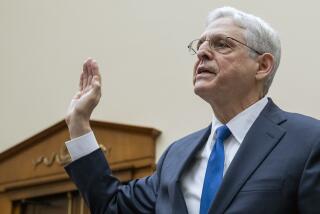Cummins fears corruption investigation led to his firing
- Share via
WASHINGTON — Still uncertain exactly why he was fired, former U.S. Atty. H.E. “Bud” Cummins III wonders whether it had something to do with the probe he opened into alleged corruption by Republican officials in Missouri amid a Senate race there that was promising to be a nail-biter.
Cummins, a federal prosecutor in Arkansas, was removed from his job along with seven other U.S. attorneys last year.
In January 2006, he had begun looking into allegations that Missouri Gov. Matt Blunt had rewarded GOP supporters with lucrative contracts to run the state’s driver’s license offices. Cummins handled the case because U.S. attorneys in Missouri had recused themselves over potential conflicts of interest.
But in June, Cummins said, he was told by the Justice Department that he would be fired at year’s end to make room for Timothy Griffin -- an operative tied to White House political guru Karl Rove.
In an interview Thursday, Cummins expressed disgust that the Bush administration may have fired him and the others for political reasons. “You have to firewall politics out of the Department of Justice. Because once it gets in, people question every decision you make. Now I keep asking myself: ‘What about the Blunt deal?’ ”
Democratic lawmakers on Capitol Hill have cited the firing of Cummins and the corruption investigation he was supervising as evidence that the dismissals were politically motivated.
What happened to Cummins appears similar to the termination of U.S. Atty. David C. Iglesias in Albuquerque. Iglesias, who was in the midst of a long government corruption case against New Mexico Democrats, has said he believes some GOP lawmakers in Washington wanted the probe speeded up to help the Republican candidate in a tight House race there.
“As we examine how these U.S. attorneys were fired, we must not lose sight of the real story,” Rep. Rahm Emanuel (D-Ill.), chairman of the House Democratic Caucus, said Thursday. “The fired U.S. attorneys were aggressively investigating public corruption cases, and they were fired ostensibly for job performance -- which in this White House means you’re guilty of doing your job.”
The Missouri corruption allegations centered on a change in the law that allowed for privatization of the state’s license fee agencies. In 2005, Missouri newspapers began reporting that some of the contracts went to Blunt’s supporters, including the wife of the U.S. attorney in Kansas City, Todd Graves.
When Cummins started investigating, he said, he followed Justice Department protocol by refusing to acknowledge whether his office had opened a probe. Policy also stipulates that when an investigation ends with no charges, it should never be publicly acknowledged.
As the months wore on, Cummins said, he “had no communication with anybody in any senior level” at the Justice Department in Washington.
But, he said, the governor had hired a private attorney who called and inquired about the status of the investigation. “The attorney said it was creating a lot of media in Missouri about political pressure and other allegations that the governor was under investigation,” Cummins said.
He said the attorney wanted assurances that the governor was not the target “because we’d like to be able to say that.”
Cummins said he did not comment to the attorney because the investigation was confidential. He declined to identify the governor’s lawyer.
In June, Cummins was notified that he was being fired. Around that time, he said, the investigation was nearly over. But he said FBI agents were tied up with other priorities and could not get to the remaining interviews right away.
In October, Cummins announced that the investigation was over. He broke with precedent, he said, because of all the media reports in Missouri.
“The matter has been closed with no indictments sought or returned,” he said on Oct. 4. He added that “at no time was Gov. Blunt a target, subject or witness in the investigation, nor was he implicated in any allegations being investigated. Any allegations to the contrary are uninformed and erroneous.”
In the Thursday interview, Cummins denied that he took that extra step as a favor to Blunt. “I didn’t know what the politics were up there in Missouri,” he said. “I couldn’t pick Matt Blunt out in a lineup.”
The announcement came just four weeks before the Missouri Senate vote in which Democrat Claire McCaskill very narrowly upset GOP incumbent Sen. Jim Talent. McCaskill’s office declined to comment about whether the closed investigation helped her campaign.
More to Read
Get the L.A. Times Politics newsletter
Deeply reported insights into legislation, politics and policy from Sacramento, Washington and beyond. In your inbox three times per week.
You may occasionally receive promotional content from the Los Angeles Times.











